La Face B a rencontré VLURE, un groupe venu tout droit de Glasgow, porteur d’une vague de chaos maîtrisé, de vérité brute et de communion électrique. En première partie de Primal Scream à La Cigale, ils ont imposé leur mélange intense et singulier de post-punk, d’euphorie électronique et de trance gothique. VLURE bouscule les codes, fédère les corps comme les cœurs, avec un son viscéral et percutant qui s’écoute comme on entre en transe. Leur premier album, Escalate, sort aujourd’hui – le 26 septembre – et s’annonce déjà comme une déflagration sur les scènes européennes. Plongez dans une interview vibrante et sans fard, où il est question de Glasgow, d’amitié, de chaos créatif et d’une foi inébranlable dans le pouvoir du live.
Retrouvez également le travail d‘Alexia Arrizabalaga-Burns (sous le pseudo Troubleshooteur) sur son site et sur Instagram
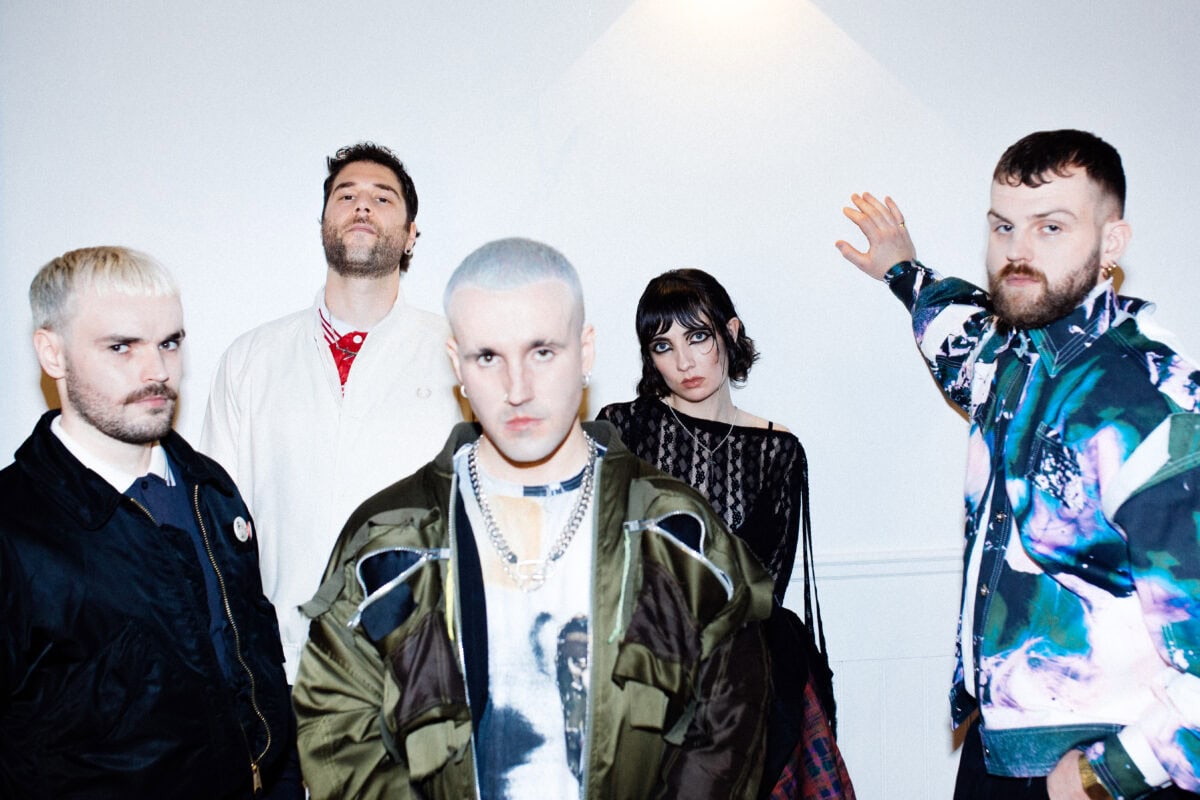
« On voulait que ce premier album (Escalate) soit un défi, quelque chose de distinct. Il a fallu grimper beaucoup de marches — mais on a savouré chaque pas. »
— Conor Goldie — VLURE
La Face B : Bonjour VLURE, comment allez-vous aujourd’hui ?
Hamish Hutcheson : Fatigué, mais excité. On a quitté Glasgow hier à 7h du matin. On a pris la route, puis l’Eurotunnel, et on a passé la nuit à Amiens. Ce matin, on est arrivés à Paris.
La Face B : Vous assurez actuellement la première partie de Primal Scream en tournée.
Hamish Hutcheson : C’est notre premier concert avec eux. Screamadelica et les différentes époques de Primal Scream ont eu une énorme influence sur nous — ils ont joué un rôle clé dans notre décision de devenir musiciens et de suivre cette voie. On les a tous vus en live plusieurs fois.
Conor Goldie : XTRMNTR est l’un de mes albums préférés. C’est une fusion puissante entre musique électronique et guitare. Après Screamadelica, ils ont pris une direction plus industrielle, avec des sons électroniques plus lourds — et c’est ce que j’écoutais en grandissant. Mes parents adorent cet album. Il a vraiment servi de modèle à nos débuts.
La Face B : C’est une super association — partir sur la route avec un groupe que vous respectez profondément et dont la musique résonne avec la vôtre.
Hamish Hutcheson : Oui, complètement. Ils ont marqué notre jeunesse. Alors quand ils nous ont demandé de les rejoindre — c’est vraiment génial.
La Face B : Vous avez tourné dans toute l’Europe, entre festivals et concerts. Comment les publics réagissent-ils à votre énergie selon les pays ?
Hamish Hutcheson : Ce que j’ai remarqué en tournant en Europe, c’est que les gens viennent aux concerts et festivals sans forcément chercher un style précis — ils viennent pour apprécier la musique sous toutes ses formes. Si tu es bon dans ce que tu fais, ils réagissent immédiatement.
Alex Pearson : Même si c’est la première fois qu’ils nous voient ou qu’ils entendent parler de nous, ils sautent partout comme si on était leur groupe préféré. L’énergie est incroyable — c’est pour ça que j’adore jouer en Europe continentale. Les gens ont vraiment l’air de passer le meilleur moment de leur vie. On a joué au Four Weather Festival au Havre, on ne savait pas à quoi s’attendre, et finalement c’était l’un de nos concerts préférés — un public super vivant et inattendu.
Hamish Hutcheson : Ils étaient déjà en feu avant même qu’on monte sur scène. On utilise une intro avant le concert, et ils faisaient déjà du crowdsurfing et perdaient la tête. On s’est dit : “OK, c’est parti !”
Conor Goldie : C’est un vrai contraste. Glasgow, selon nous, est probablement l’un des endroits les plus difficiles pour démarrer un groupe.
Hamish Hutcheson : Tout le monde est dans un groupe, mais c’est super dur de se faire remarquer.
Conor Goldie : Et il y a cette mentalité écossaise — les gens ne s’embarquent pas immédiatement. Il faut vraiment faire ses preuves.
Quand on joue chez nous et que la salle est pleine, on est toujours très touchés. Le public de Glasgow peut rester les bras croisés au début, mais une fois que tu les as conquis, ils te donnent tout. En France, c’est l’inverse — le public est en feu dès le premier morceau. Ça nous surprend à chaque fois.
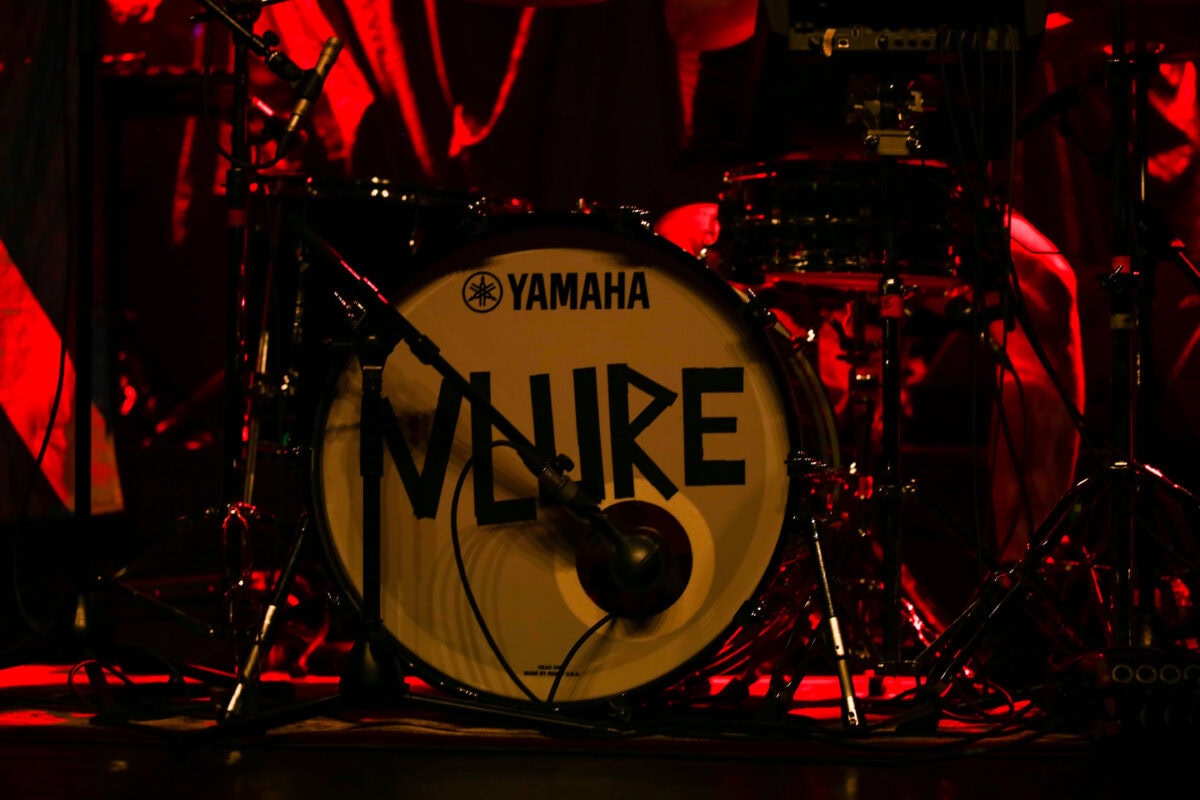
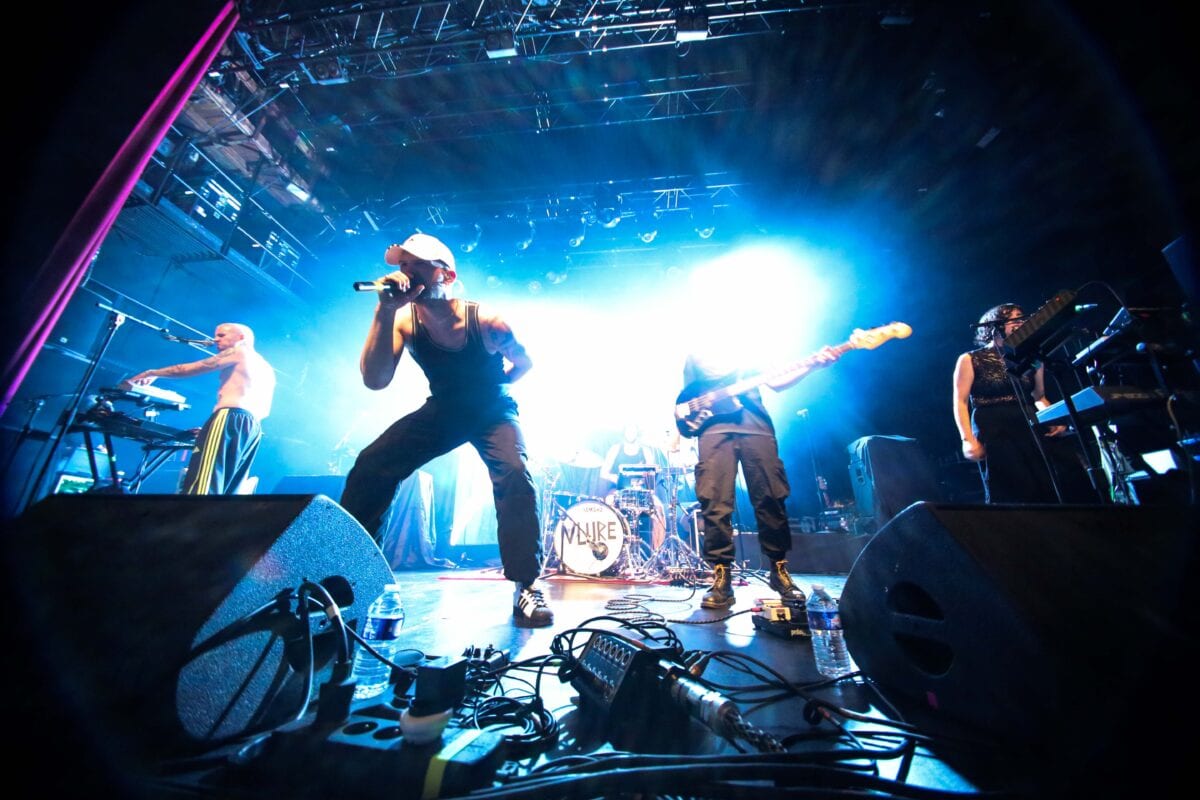
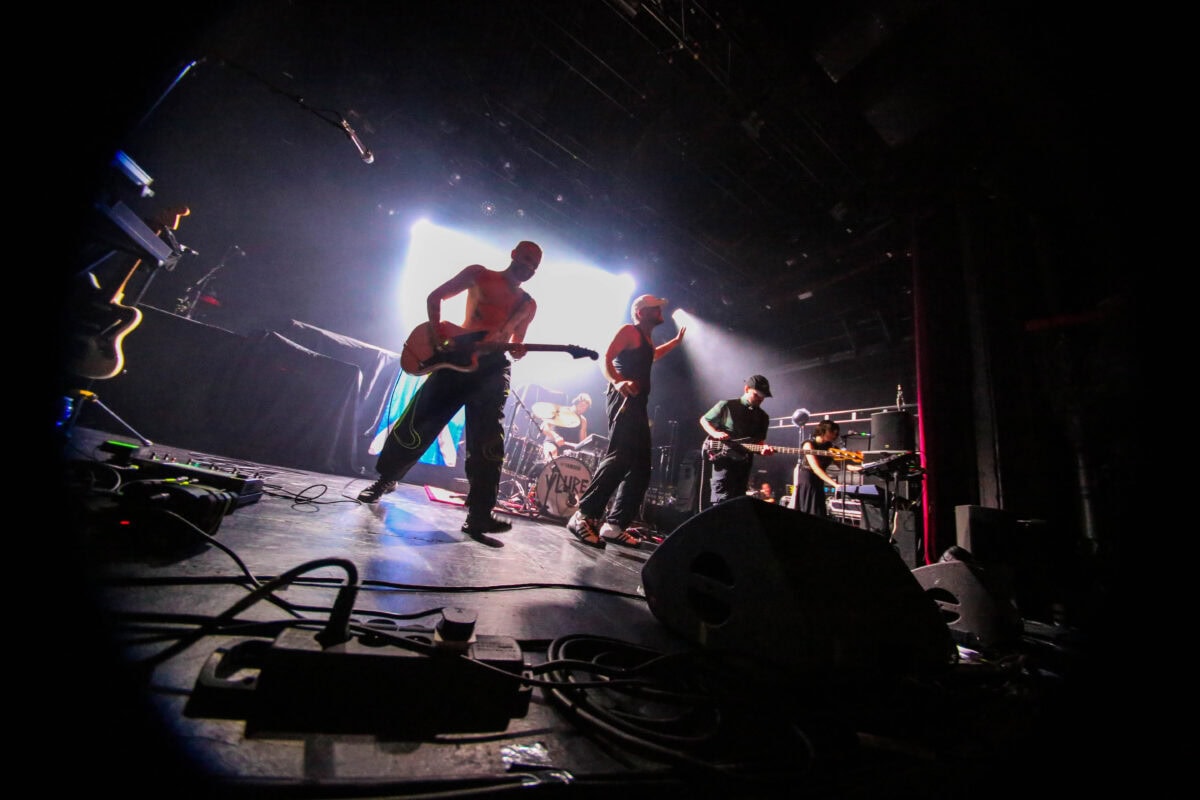
La Face B : C’est sûrement le bon équilibre — la validation de son public local est très précieuse. Glasgow a une telle richesse musicale ; il doit y avoir quelque chose dans l’eau ! Donc Conor, toi et Niall êtes frères. Comment ce lien a-t-il influencé les débuts de VLURE, et comment Hamish, Alex et Carlo sont-ils arrivés dans l’aventure ?
Conor Goldie : Nos parents sont complètement passionnés de musique. Ils ne sont pas musiciens, mais la musique est au cœur de leur vie. On a grandi baignés dedans — il y avait toujours des albums qui tournaient à la maison. Certains de mes premiers souvenirs sont liés à cette obsession pour ce qu’ils écoutaient. Naturellement, Niall et moi avons commencé à faire de la musique ensemble à l’adolescence. On a joué dans les groupes d’autres gens pendant des années — c’était parfait pour apprendre. C’est comme ça qu’on a rencontré Carlo, en jouant dans d’autres groupes et en faisant des sessions.
Hamish Hutcheson : Tu m’as rencontré il y a environ sept ans, et Alex, six ans. On a lancé VLURE il y a cinq ans. Conor gérait un label et une société de promotion à Glasgow, et il avait booké mon ancien groupe pour un festival. L’histoire dit que la mère de Conor et Niall m’a vu sur scène et a dit : “Voilà ton chanteur pour le nouveau projet.” Ensuite ils m’ont envoyé un message — et voilà où on en est.
La Face B : C’est génial. Toujours écouter sa mère.
Hamish Hutcheson : Exactement.
Conor Goldie : Meilleur conseil possible.
La Face B : Parlons de votre son signature trance punk ou goth trance — comment s’est-il construit ?
Conor Goldie : C’est une obsession pour les deux faces d’une même pièce.
En grandissant à Glasgow, il y a cette longue lignée de groupes à guitares et une scène live incroyable. Mais en vieillissant — à l’adolescence, puis début vingtaine — tu passes tes nuits dans les clubs, les afters. Cette expérience nocturne s’est naturellement intégrée à ce qu’on fait. Dès notre tout premier clip — Desire — ça commence avec une séquence étrange et puis Carlo balance un solo de batterie, ce qui est peu conventionnel.
Hamish Hutcheson : Vibes industrielles.
Conor Goldie : C’était voulu. Peu de gens arrivent à bien fusionner ces éléments — et ça nous a demandé beaucoup de travail.
Hamish Hutcheson : On a bossé très dur pour en arriver là — aujourd’hui, on peut dire : “C’est ça qu’on voulait créer.” On a encore de la marge, mais on y est presque.
Conor Goldie : Sans rentrer trop dans la technique, c’est compliqué. Notre ingénieur mix, James Rand, qui a bossé sur l’album, a partagé un morceau et a expliqué à quel point c’est difficile de mélanger production électronique et batterie live — problèmes de phase, de flanger, tout ça. Mais il a dit qu’on avait fait du bon boulot. Donc sur ce point, on peut dire qu’on a réussi.
La Face B : Et c’est ce qui vous rend uniques — votre singularité.
Hamish Hutcheson : Comme Conor l’a dit, pendant des années on a joué dans des groupes où on servait la vision de quelqu’un d’autre. Avec VLURE, les cinq, on voulait créer quelque chose qui nous représente pleinement. On a chacun des influences très variées — l’idée, c’était de les fusionner en un son qu’on aime entendre autant que jouer.
Conor Goldie : La scène créative à Glasgow a aussi beaucoup évolué. Il y a dix ans, les scènes étaient très cloisonnées. Aujourd’hui, avec la fermeture des petites salles et la baisse des financements, tout s’est mélangé. Notre bâtiment studio est rempli d’amis — des DJs techno, des rappeurs, des chanteuses de jazz — et ils font tous partie de notre monde maintenant. C’est plus fluide, et c’est magnifique.
La Face B : Quel est votre processus d’écriture ? Vous jammez ou c’est plus structuré ?
Hamish Hutcheson : On a essayé de jammer, mais ça finit toujours en fou rire. De mon point de vue — je ne suis pas très technique — je les regarde arriver avec des idées : un hook vocal, une ligne de batterie, un riff de synthé. Ensuite, on se rassemble autour du laptop, on sort les instruments, et on construit à partir de ça.
Alex Pearson : Nos premières démos ont toujours trop de couches — des centaines de pistes. Ensuite, on épluche tout pour garder quelque chose de propre et de précis.
Conor Goldie : C’est comme si on “dé-remixait”. Parfois, quelqu’un arrive avec un instrumental qui sonne comme un morceau de club — et on l’adapte au format groupe. On taille, on remodèle, on reconstruit.
La Face B : Donc c’est très constructif. On construit, on déconstruit, et on reconstruit.
Alex Pearson : Exactement. C’est ça.
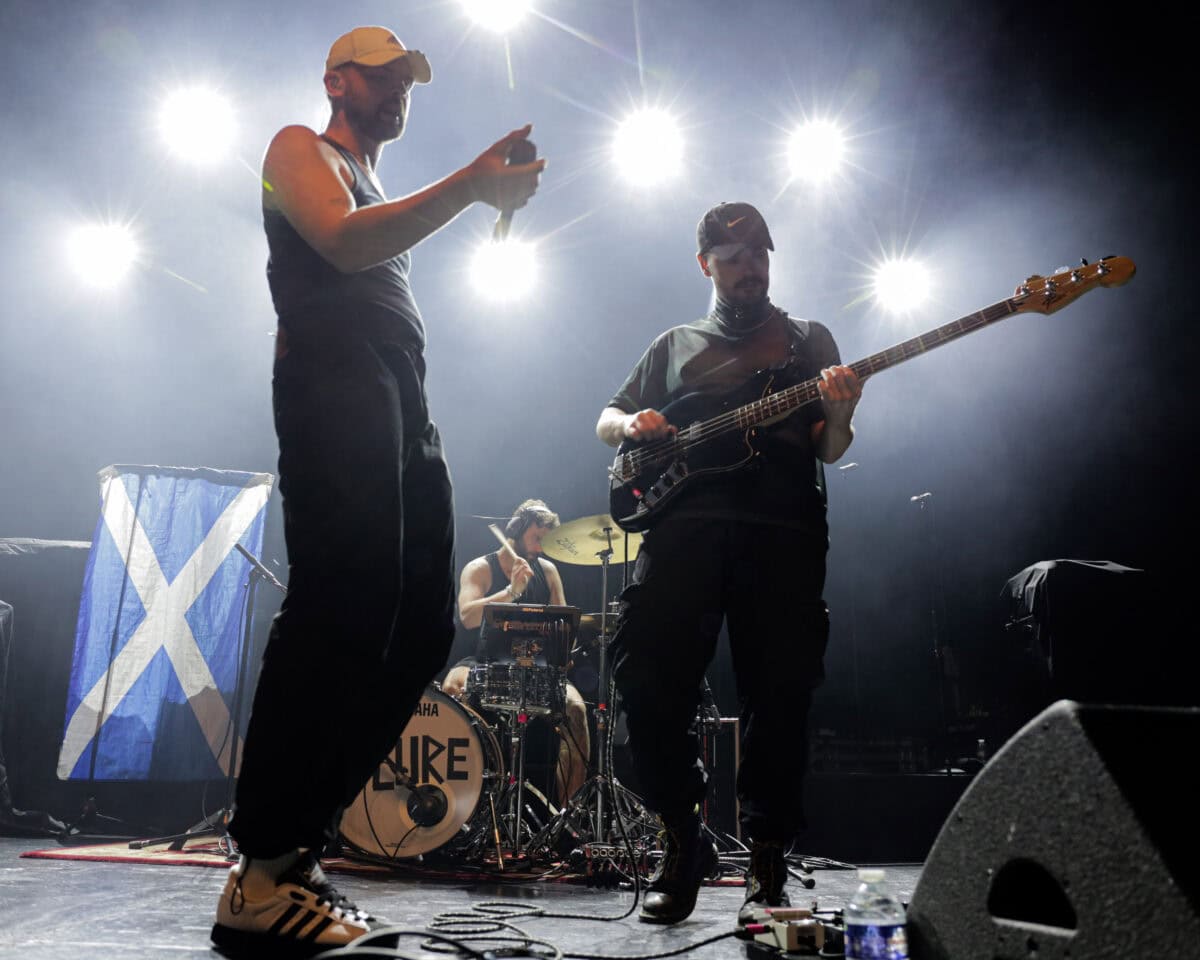
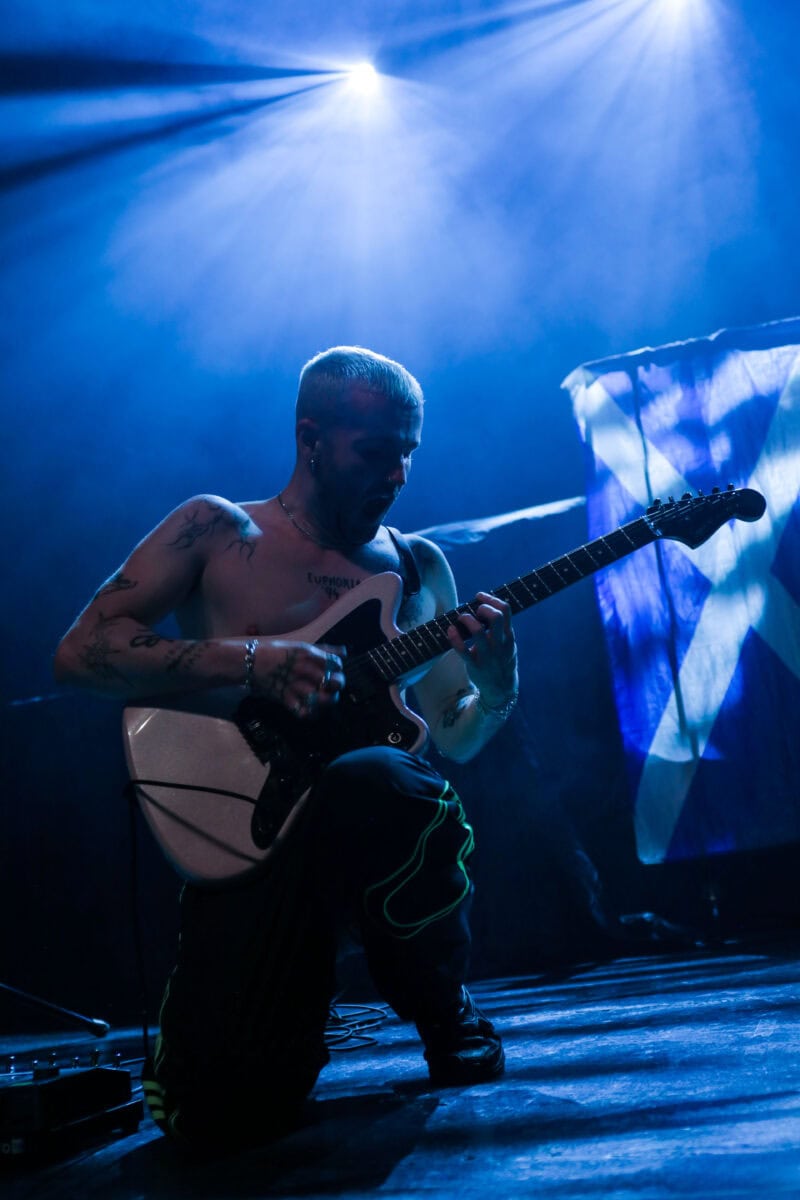
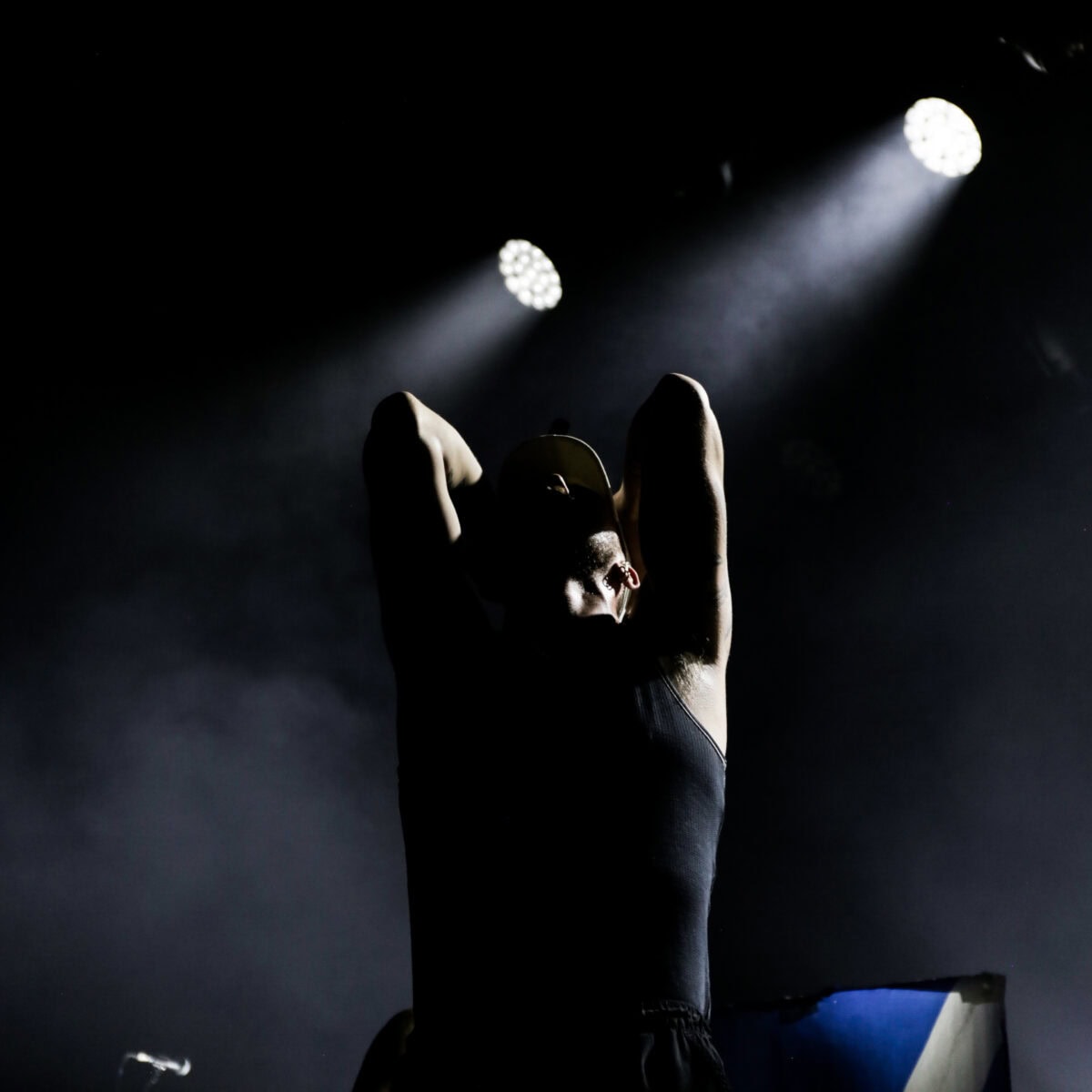
La Face B : J’ai lu que vous ne gardiez un morceau que s’il a cette vibration “live”. C’est vrai ?
Hamish Hutcheson : Carrément. Parfois on revient à une vieille démo, et l’un de nous a une nouvelle idée. Mais si ça ne nous excite pas, ça ne va exciter personne d’autre.
Tu peux passer deux semaines bloqué sur le même morceau pour finalement te rendre compte — ça ne fonctionne pas.
Conor Goldie : Si on travaille trop longtemps sur quelque chose, on le jette. En général, ça veut dire que ça n’en vaut pas la peine.
Nos morceaux préférés sont souvent ceux qui sont venus très vite.
La Face B : Votre concert parisien au Supersonic a été décrit comme une “expérience religieuse”, avec Hamish littéralement en train de prêcher sur scène. Comment équilibrez-vous la spontanéité live avec l’énergie studio ?
Hamish Hutcheson : Pour moi, c’est la même chose. En répète, je bouge et saute autant que sur scène.
Je me perds complètement dans la musique que les gars créent, et j’ai la chance de raconter une histoire par-dessus. C’est la chose la plus belle que j’ai jamais faite — comme une thérapie. Je descends de scène dix fois plus léger.
Ce n’est jamais du spectacle — c’est juste sincère. On se perd tous ensemble dans le moment. Un chaos contrôlé qui fonctionne.
La Face B : J’ai interviewé Kelly Finnegan de Monophonics, et il disait que l’énergie qu’on envoie traverse le public et nous revient comme un boomerang. Ça crée quelque chose de mémorable.
Conor Goldie : Je suis totalement d’accord. C’est ça le but — pas l’ego, pas “faire le show”. C’est la connexion. Le public est aussi important que nous.
Hamish Hutcheson : Il s’agit de construire une communauté — créer un espace où les gens peuvent s’évader et ressentir de la joie.
Conor Goldie : C’est notre moment préféré — rencontrer les gens, créer du lien. C’est tout pour nous.
La Face B : Vous avez inclus Salva Mea de Faithless dans votre set. Pourquoi ce morceau, et comment s’intègre-t-il ?
Conor Goldie : Ça vient sûrement de moi — mes parents adorent Faithless, et j’ai grandi avec Salva Mea. Ce morceau a été un vrai modèle pour nous. À la base, on en a fait une reprise.
Hamish Hutcheson : On s’était toujours dit qu’on ne ferait jamais de reprises. Mais pendant le confinement, on devait jouer deux originaux et une reprise pour un livestream. Alors on a mixé une intro DJ avec Salva Mea.
Aujourd’hui, ça s’enchaîne avec Shattered Faith dans notre set — et les deux morceaux s’imbriquent super bien.
Conor Goldie : C’est un hommage, vraiment.
Hamish Hutcheson : L’une des meilleures reprises qu’on ait jamais faites.
Conor Goldie : On ne serait pas là sans ce que Faithless a fait avant nous.
La Face B : Parlons de vos propres morceaux. Heaven Sent semble être une avancée par rapport à Euphoria — autant en production qu’en attitude. Comment votre son a-t-il évolué entre ces deux EPs ?
Conor Goldie : Énormément. Heaven Sent était nécessaire. On avait le dos au mur. On l’a sorti nous-mêmes, avec l’aide d’un bon ami. Il y avait une vraie résilience derrière ces morceaux.
La plupart ont été testés en live avant d’aller en studio. Cutting It était une idée ancienne.
Hamish Hutcheson : On l’a peaufinée en tournée — puis emmenée en studio.
Conor Goldie : Carlo a apporté This Is Not The End, qui est le seul morceau de cet EP qu’on joue encore en live.
La plupart de notre set vient du nouvel album — mais celui-là, c’est un hymne.
La Face B : Votre premier album Escalate sort en septembre. Comment capture-t-il ce que représente VLURE aujourd’hui ?
Alex Pearson : On a atteint notre forme finale.
Hamish Hutcheson : Je pense que l’album montre à quel point on a confiance en nous et en ce qu’on crée en ce moment. C’était le bon moment pour faire un format long. Les gens nous le demandaient — on avait sorti des EPs, des singles — et quand l’opportunité d’enregistrer un album s’est présentée, on a dit : “C’est parti.” J’ai hâte que les gens l’écoutent. Il incarne qui on est — c’est une photo instantanée de ce moment.
La Face B : Racontez-nous pourquoi vous avez choisi Escalate comme titre.
Conor Goldie : Il y a une chanson sur l’album qui s’appelle Let It Escalate. Notre manager, Taylor, a prononcé le mot “Escalate” pendant qu’on bossait sur ce morceau — je crois que Niall l’a crié en studio. On n’arrivait pas à se décider sur un titre d’album, et Taylor a juste dit : “Appelez-le Escalate.”
Hamish Hutcheson : Selon le dictionnaire, ça signifie devenir plus intense, ou s’intensifier rapidement.
Conor Goldie : Et ça résume parfaitement le son de l’album. Il y a des moments de chaos total — certains des morceaux les plus rapides qu’on ait jamais faits. On est montés à 150 BPM, alors qu’on n’avait jamais dépassé 126 auparavant. C’est un vrai bond.
Hamish Hutcheson : Du coup, j’ai dû apprendre à parler plus vite !
La Face B : Décrivez Escalate avec vos propres mots.
Conor Goldie : Escalate a été une entreprise de taille, mais c’était totalement nécessaire. On voulait que notre premier album se tienne tout seul — qu’il soit audacieux, distinct. C’est ce qu’on a toujours voulu depuis le premier jour. Il a fallu gravir pas mal d’étapes — mais on a apprécié chaque marche. Il mélange toutes nos influences post-punk, tous les éléments électroniques, et tout ce que Hamish apporte — et ça explose en un seul endroit. On a travaillé avec des personnes incroyables, dont Manni Dee, qui a co-produit l’album. C’est l’un de mes producteurs préférés — et il ne travaille presque jamais avec des groupes, donc c’était spécial.
Hamish Hutcheson : Pour moi, Escalate, c’est comme imaginer ta jeunesse comme une longue nuit dehors — traverser différentes étapes de la vie, évoluer vers l’adulte que tu veux devenir. Les épreuves, les joies, la fierté, la douleur — tout y est.
C’est nostalgique, mais puissant. C’est ce que je ressens — de la puissance.
Conor Goldie : Il y a clairement une narration.
Alex Pearson : Pour moi, Escalate, c’est cinq meilleurs potes qui bossent sur quelque chose de vraiment spécial — un truc qu’on construit depuis des années.
Carlo Kriekaard : C’est l’étape suivante — une escalade dans notre carrière.
Hamish Hutcheson : Carlo, c’est le mec business. 100 % business.
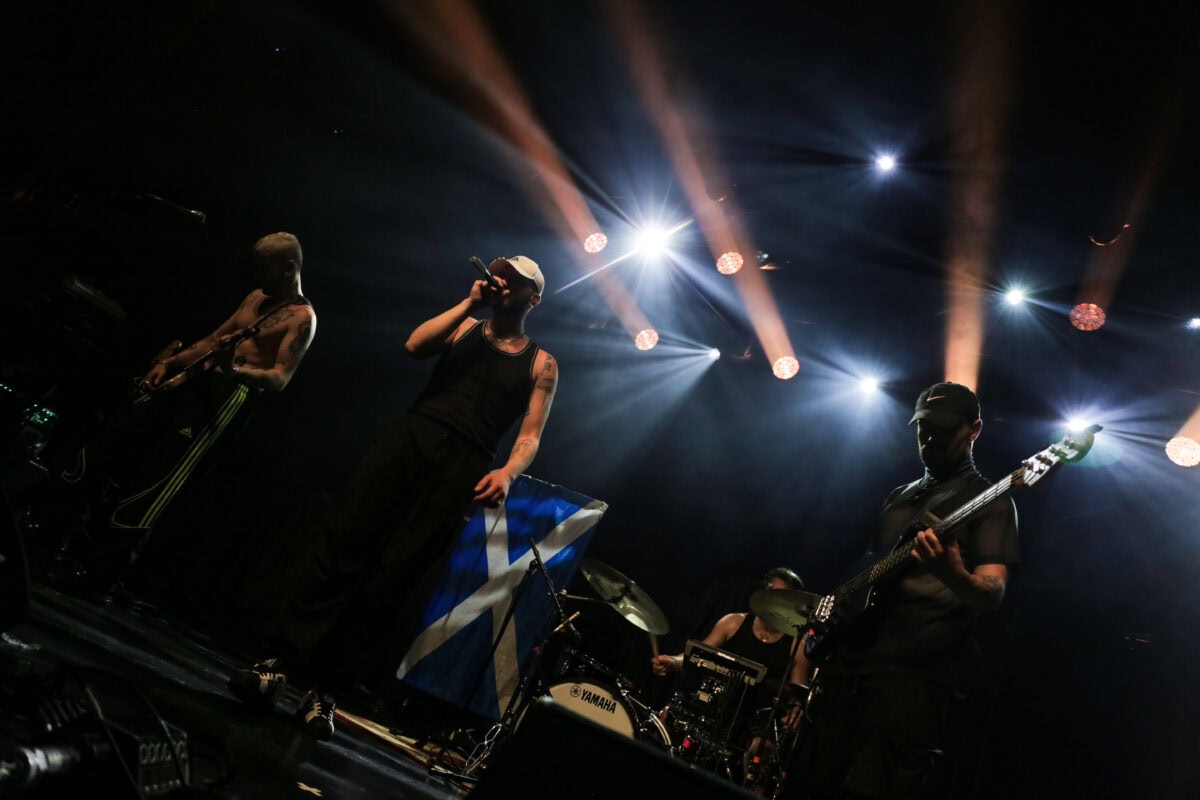
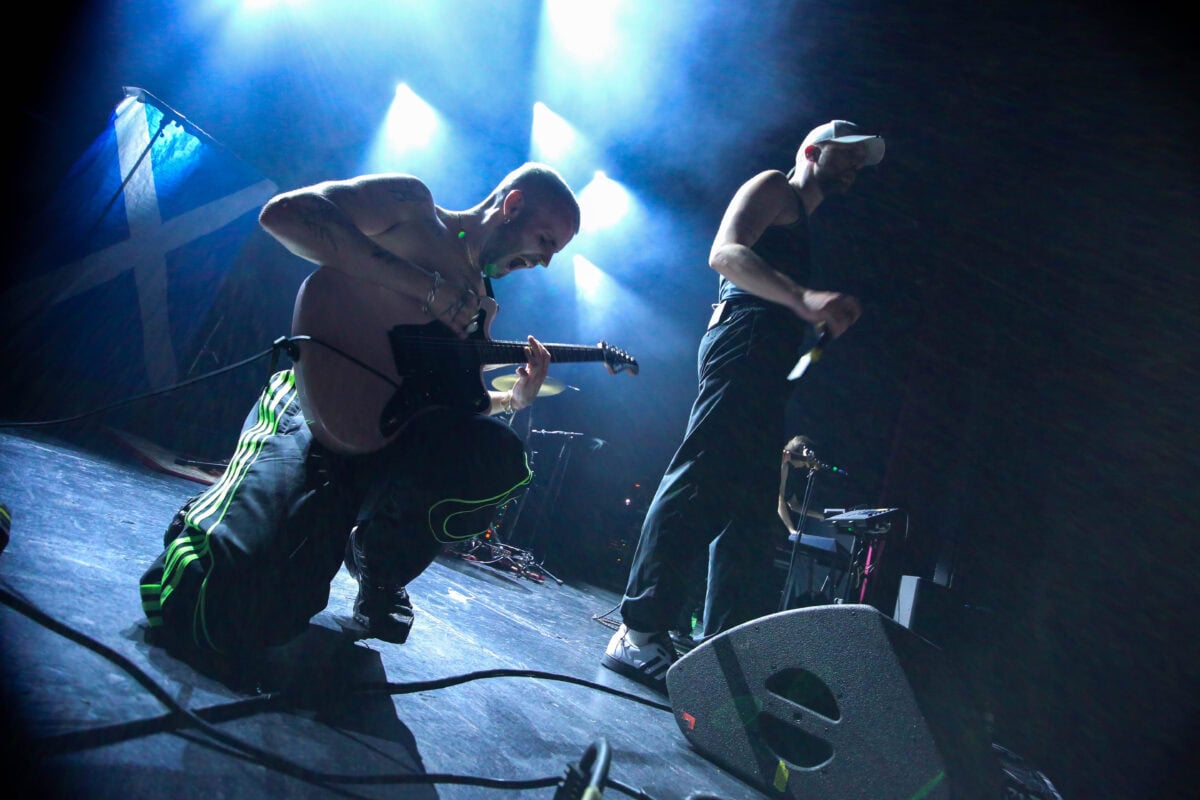
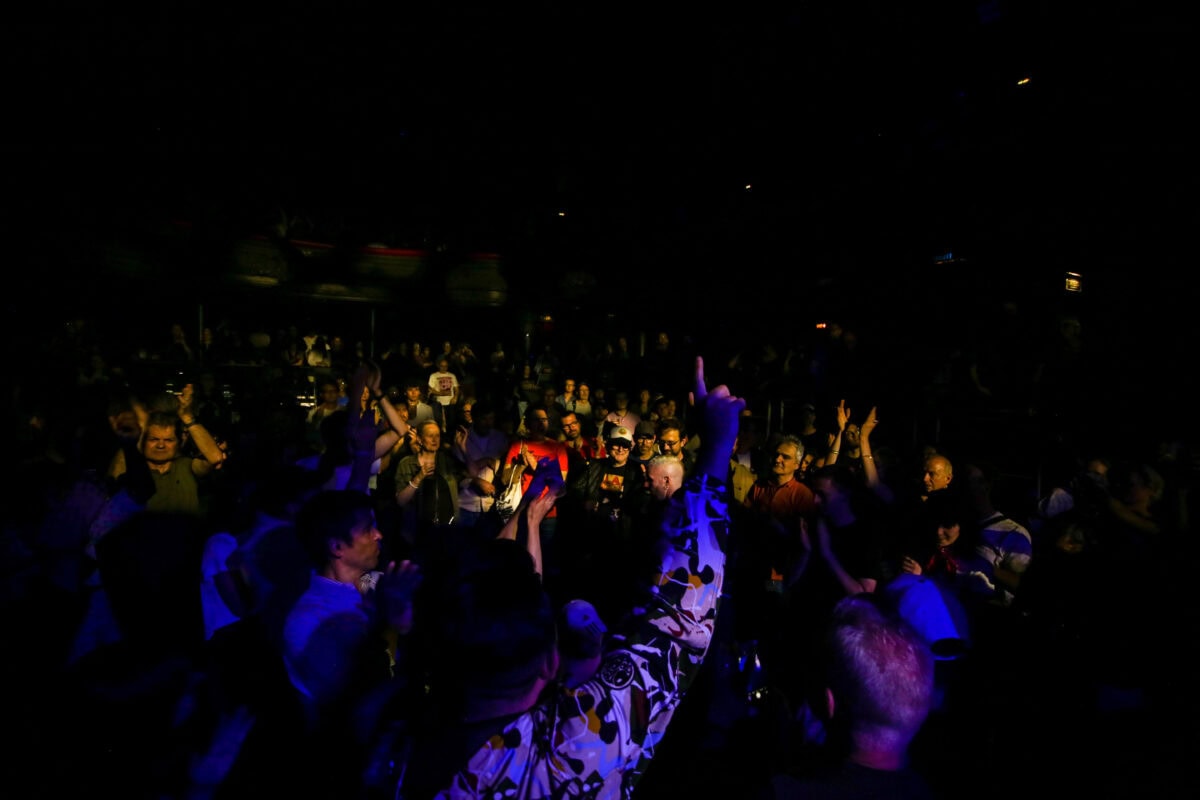
La Face B : Vous venez de Glasgow — une ville connue pour sa franchise, son caractère et son immense héritage musical — selon vous, qu’est-ce qu’il faut impérativement à un groupe de Glasgow pour survivre ?
Hamish Hutcheson : Un public difficile. Et des fish & chips.
Conor Goldie : J’ai mangé bien trop de fish & chips avant des concerts.
Alex Pearson : De longs trajets pour aller jouer.
Hamish Hutcheson : Il n’y a aucune salle à côté de Glasgow — tout est une expédition.
Carlo Kriekaard : Tout le monde se fixe des standards très élevés. Ça se ressent dans tout. Tout le monde veut réussir et se soutient. Ce n’est pas une compétition malsaine, mais tu gardes un œil sur ce que font les autres — et ça te pousse à rester au top.
La Face B : Pourtant, on sent quand même une vraie solidarité.
Hamish Hutcheson : Très solidaire — mais comme Carlo l’a dit, tu dois faire tes preuves. C’est un peu : “T’es qui toi, en fait ?” — jusqu’à ce qu’ils soient obligés de faire attention. Et là, ils te soutiennent à fond.
Conor Goldie : C’est juste Glasgow. Si tu dis que tu es dans un groupe à Londres, les gens disent : “Oh cool, ça doit être sympa !”
À Glasgow, dans un pub, la réponse c’est : “Lui aussi, lui aussi, elle aussi…”
La Face B : J’ai passé pas mal de temps en Écosse. J’adore cette mentalité directe. Je préfère qu’on me dise la vérité plutôt qu’un compliment bidon et que personne ne vienne ensuite.
Conor Goldie : Si quelqu’un ne t’aime pas à Glasgow, tu le vois direct sur son visage.
La Face B : Qui est votre héros musical écossais ultime ?
Hamish Hutcheson : Pour moi, Dale Barclay. Il est tout en haut.
Conor Goldie : Quelle question immense. Alex Harvey, évidemment. Mais honnêtement, mes plus grands héros musicaux écossais sont sans doute tous ces artistes incroyables que j’ai vus à Glasgow au fil des années — beaucoup n’ont jamais eu les opportunités qu’ils méritaient. Je gravite autour de la scène musicale de Glasgow depuis plus de dix ans, et certains des meilleurs concerts que j’ai vus étaient dans des toutes petites salles. Continuer dans un groupe, c’est dur — financièrement, émotionnellement. C’est une décision difficile pour beaucoup.
La Face B : Créer ce qu’on veut, au rythme qu’on veut, c’est un vrai luxe.
Conor Goldie : Avoir des jours de congé pour jouer, c’est l’enfer pour la plupart des gens.
Trop de groupes brillants. Trop de héros. Et oui — sûrement encore plus de pintes.
La Face B : Quel est un artiste ou un morceau qu’on serait surpris d’apprendre que vous aimez ?
Conor Goldie : J’écoute le nouveau PinkPantheress en ce moment. Lequel ? Juste… tout PinkPantheress, en fait.
La Face B : Un livre, un film ou une série qui vous a touchés récemment ?
Conor Goldie : On Connection de Kae Tempest. J’ai trouvé ça incroyable — tout le monde devrait le lire. Ça n’a jamais été aussi pertinent. Il est sorti il y a quelques années, mais je l’ai lu il y a quelques semaines.
Hamish Hutcheson : Je viens de finir Windswept and Interesting de Billy Connolly. Super bouquin — il a grandi à Glasgow, et il est tellement lui-même, sans honte. Je lis aussi Kitchen Confidential d’Anthony Bourdain. Excellent livre.
La Face B : Où pourra-t-on vous voir ensuite ?
Conor Goldie : On joue à Reading et Leeds, et dans pas mal d’autres festivals. L’album sort en septembre, et on va annoncer une tournée. On sera en Octobre a Tourcoing et Paris.
La Face B : Trop bien ! Merci beaucoup, VLURE !
VLURE : Merci à toi !
Toujours plus d’interviews et de photos de concerts dans La Face B
De plus, suivez VLURE sur Spotify, en live ou sur Instagram
Enfin, retrouvez les articles d‘Alexia Arrizabalaga-Burns dans La Face B
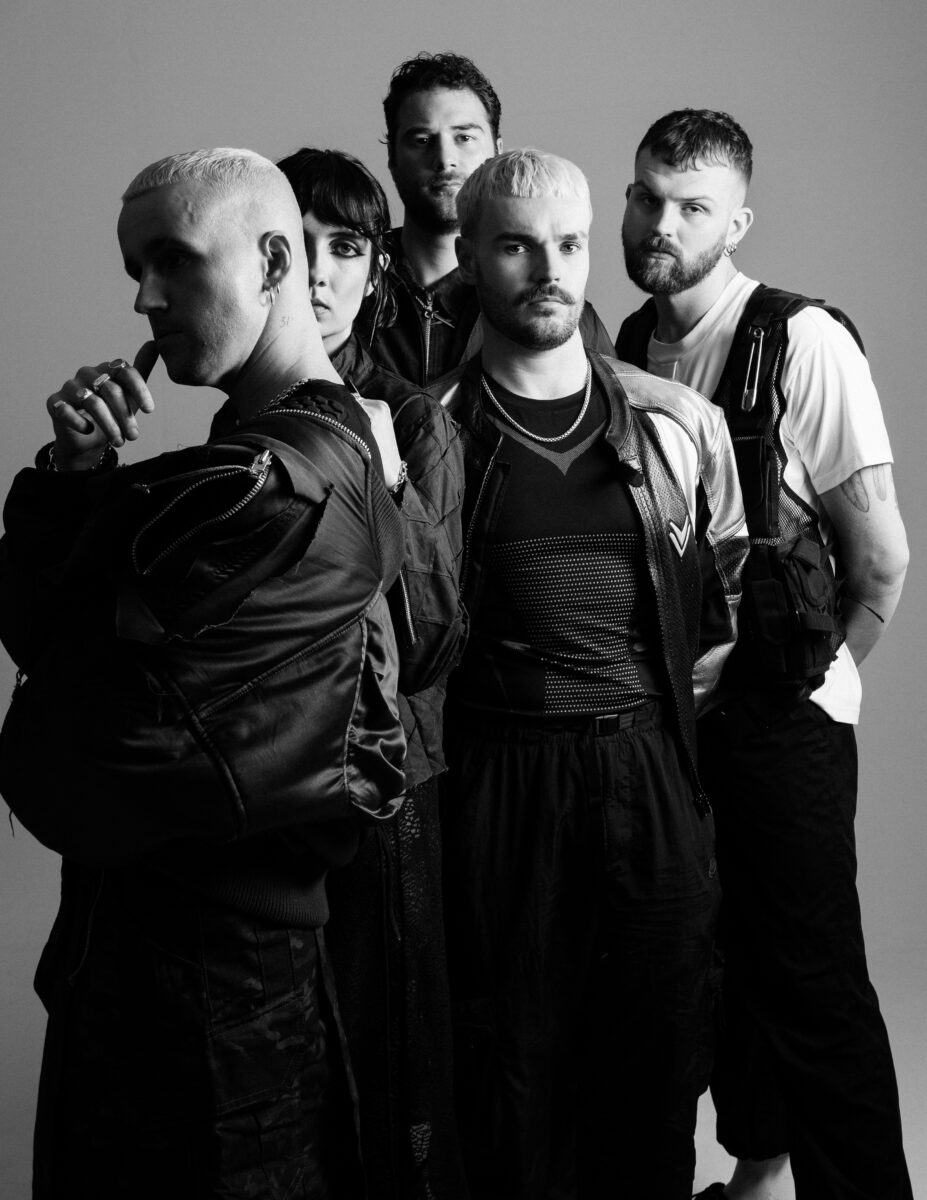
Version en Anglais
La Face B: Hello VLURE, how are you today?
Hamish Hutcheson: Tired but excited. We left Glasgow yesterday at 7am. Drove down, took the Eurotunnel, and stayed in Amiens for the night. Then drove into Paris this morning.
La Face B: You’re currently supporting Primal Scream on tour.
Hamish Hutcheson: This is our first show with them. Screamadelica and different eras of Primal Scream have had a huge influence on us — they played a big role in our decision to become musicians and follow this path. We’ve all seen them live a good few times.
Conor Goldie: XTRMNTR is one of my favourite albums. It’s such a powerful fusion of electronic and guitar-based music. After Screamadelica, they went into a more industrial direction, heavier electronics — and that’s something I grew up listening to. My parents love that record. It really became a blueprint for how we started.
La Face B: That’s such a great match — being on the road with a band you deeply respect and whose music resonates with yours.
Hamish Hutcheson: Yeah, absolutely. They were a huge part of our youth. So for them to ask us to join them — it’s really cool.
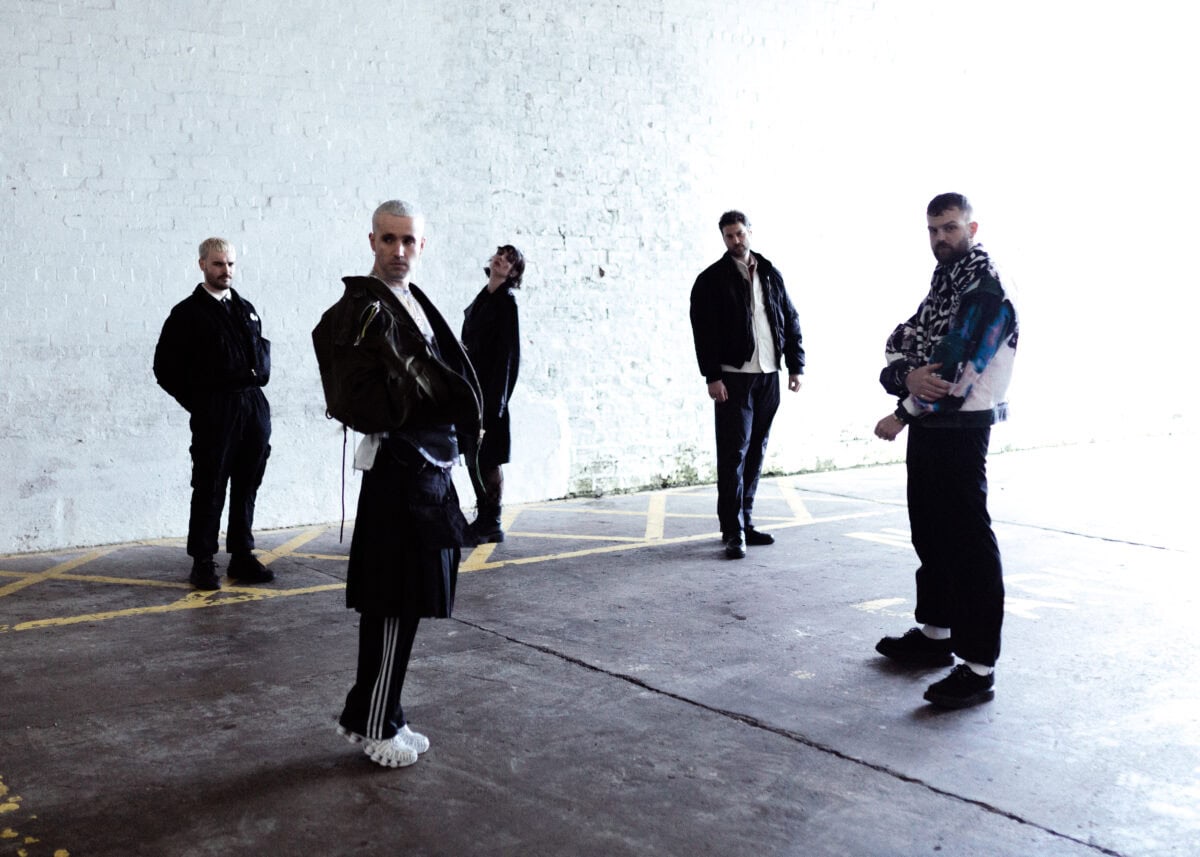
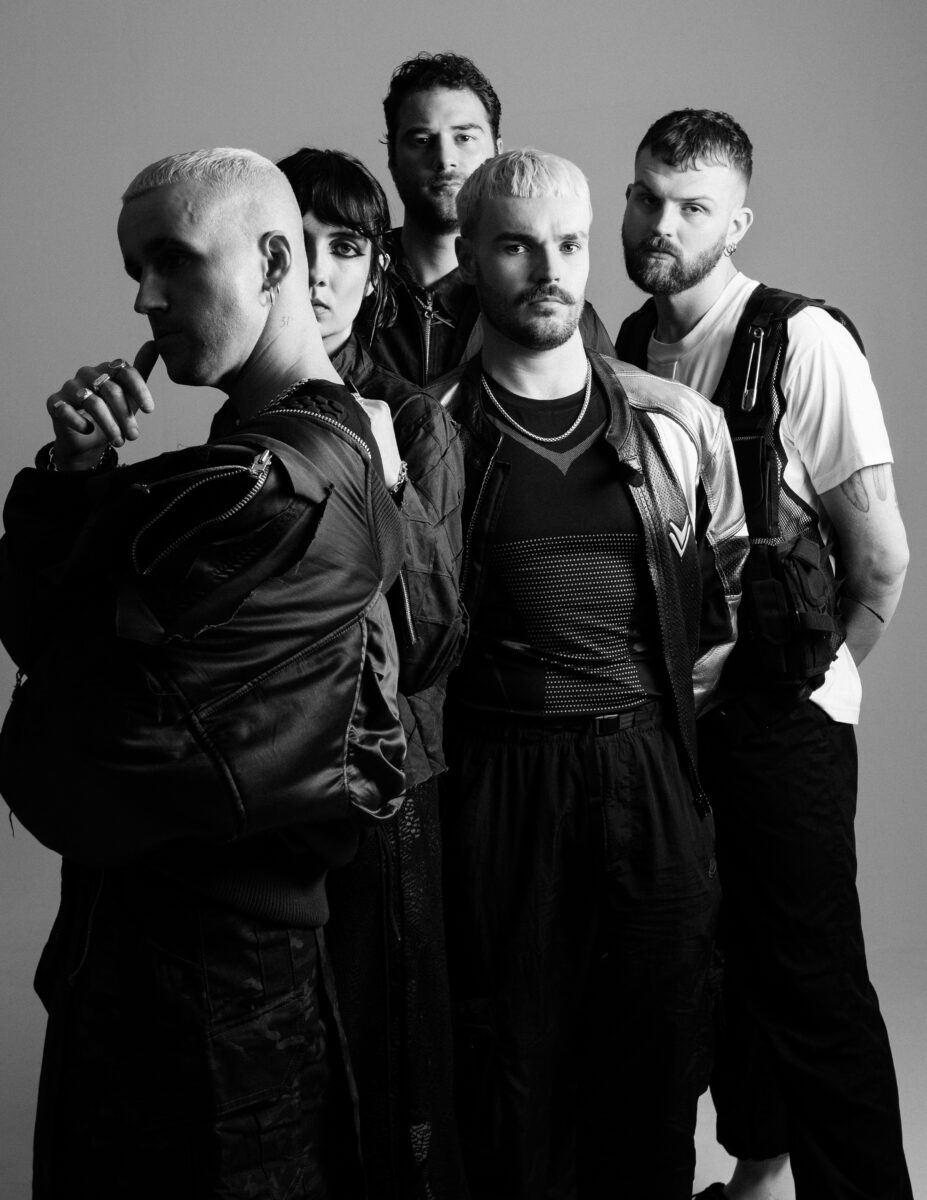
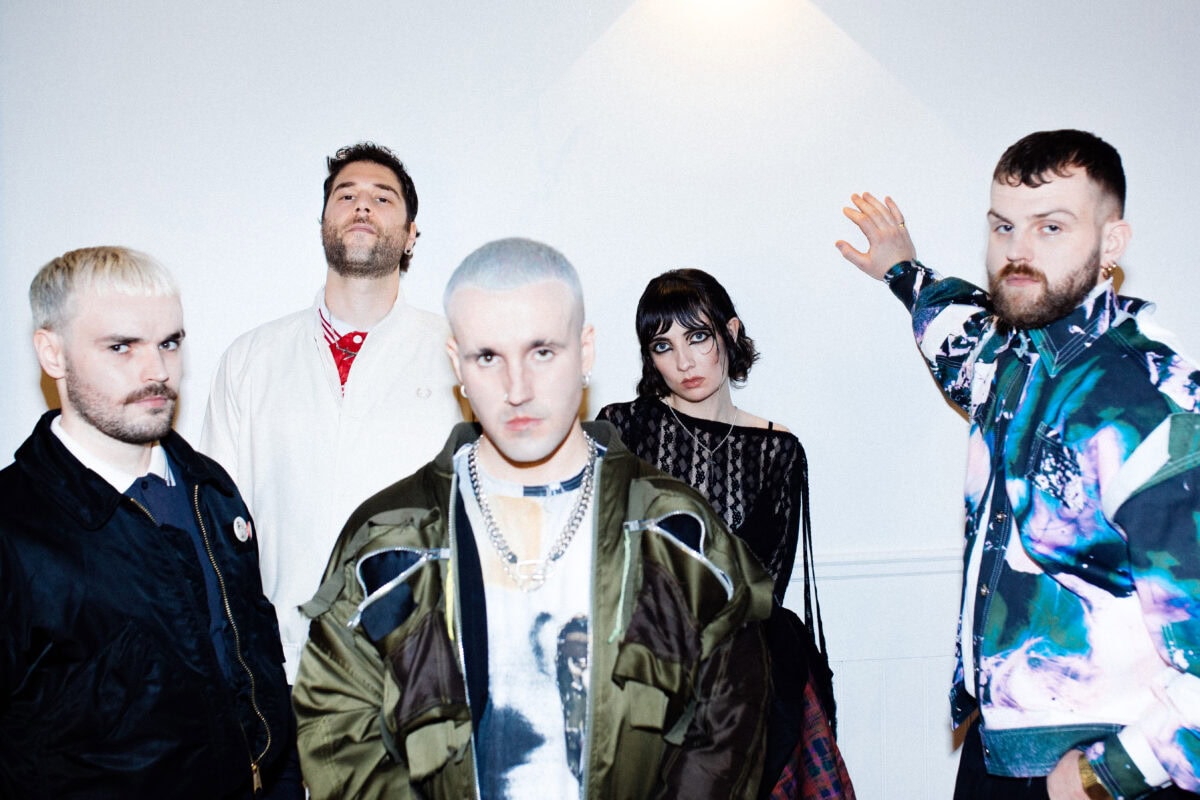
La Face B: You’ve toured across Europe, playing both festivals and gigs. How do audiences in different places respond to your energy?
Hamish Hutcheson: One thing I’ve noticed touring mainland Europe is that people come to shows and festivals not necessarily for a specific genre — they come to enjoy music in all its forms. If you’re good at what you do, they respond immediately.
Alex Pearson: Even if it’s their first time seeing us or hearing about us, they still jump around like we’re their favourite band. The energy is unreal — and that’s why I love playing in mainland Europe. People genuinely look like they’re having the best time.
We played the Four Weather Festival in Le Havre, and we didn’t know what to expect, but it turned out to be one of our favourite shows ever — such a lively, unexpected crowd.
Hamish Hutcheson: They were going wild even before we came on stage. We use an intro track before our set, and they were already crowd surfing and losing their minds. We were like, “Alright, let’s go!”
Conor Goldie: It’s a great contrast. Glasgow’s probably one of the toughest places to start a band, in our opinion.
Hamish Hutcheson: Everyone’s in a band, but it’s really hard to get noticed.
Conor Goldie: And there’s that Scottish mentality — people don’t immediately jump on board. You really have to prove yourself.
When we play a hometown show and it’s packed, we’re always humbled. Glasgow crowds might stand with their arms folded at first, but once you win them over, they give you everything. France, on the other hand — the crowd’s going wild from the first song. It still surprises us every time.
La Face B: That balance is probably what you want — validation from your hometown peers is so meaningful. Glasgow has such a rich music legacy; something must be in the water! So Conor, you and Niall are brothers. How did that connection shape the beginnings of VLURE, and how did Hamish, Alex, and Carlo come into the picture?
Conor Goldie: Our parents are absolutely obsessed with music. They’re not musicians, but music is a huge part of their lives. So we grew up immersed in it — albums playing constantly. Some of my earliest memories are being obsessed with what they were listening to.
Naturally, Niall and I started making music together in our early teens. We played in bands for other people for years — which was great for learning the ropes. That’s how we met Carlo, through playing in other bands and session work.
Hamish Hutcheson: You first met me about seven years ago, and Alex around six years ago. We started VLURE about five years ago.
Conor used to run a label/promotions company in Glasgow and booked my old band for a festival. The story goes that Conor and Niall‘s mum saw me perform and said, “That’s your frontman for the new project.” Then they messaged me — and here we are.
La Face B: That’s amazing. Always listen to your mum.
Hamish Hutcheson: Exactly.
Conor Goldie: Best advice ever.
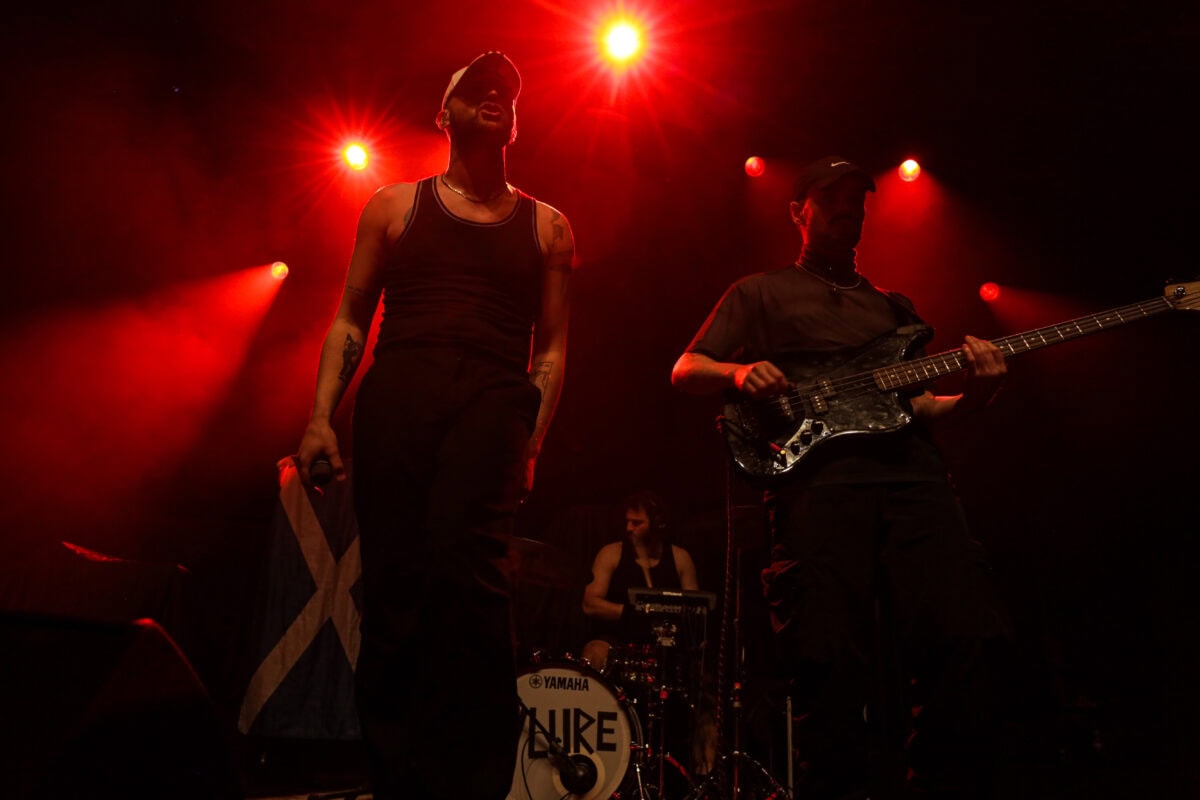
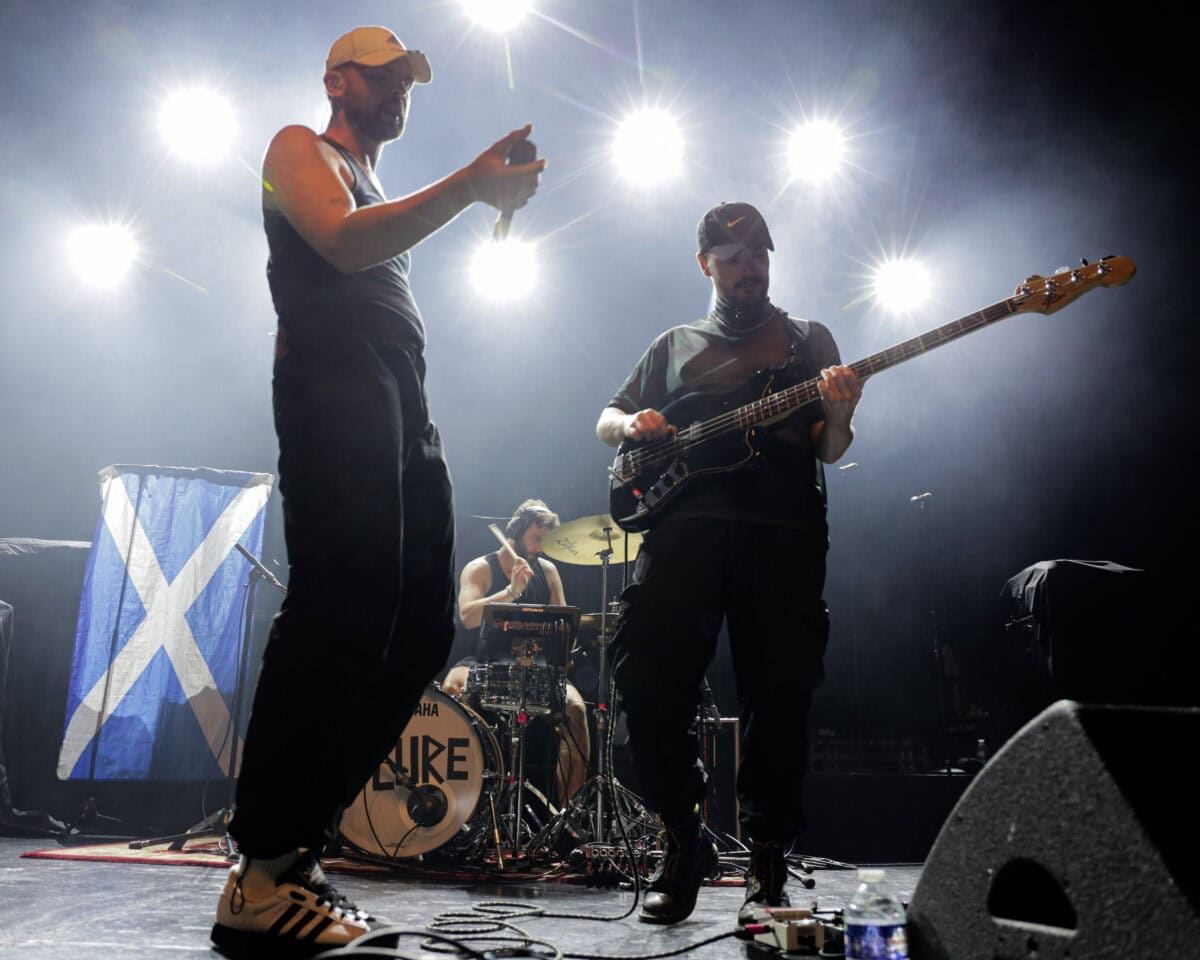
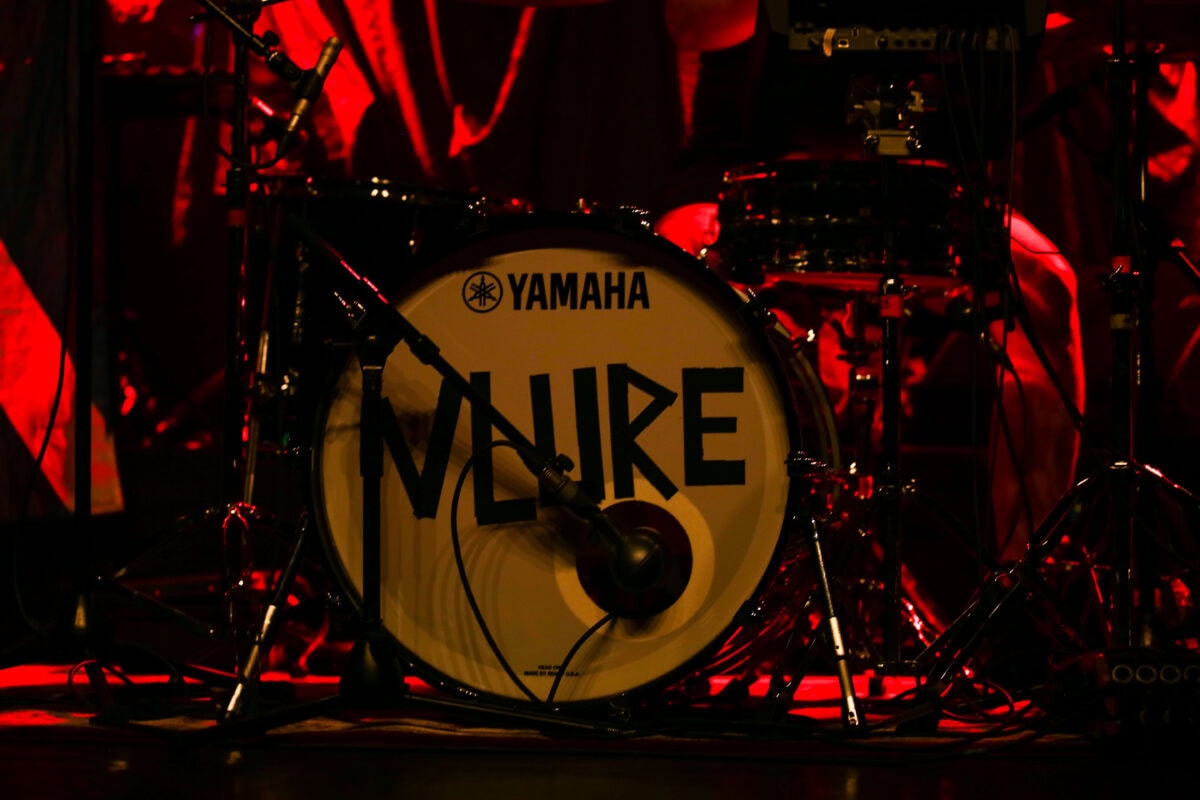
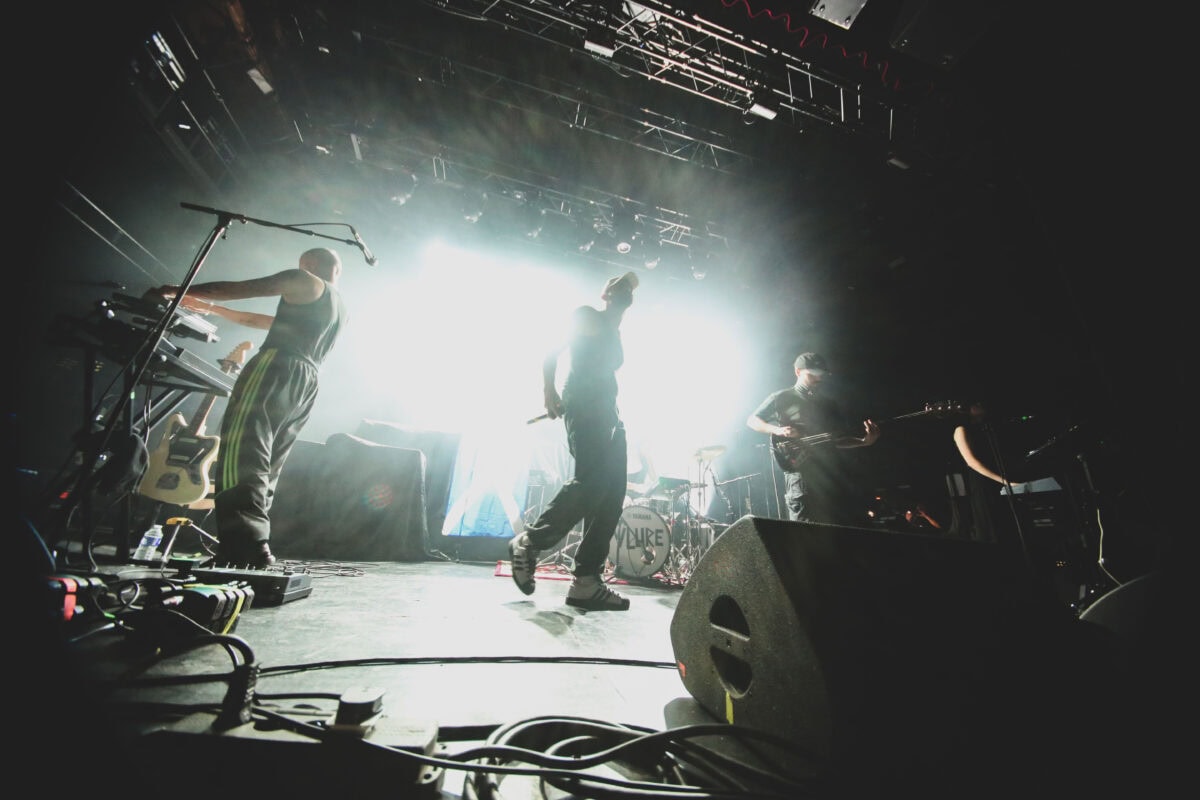
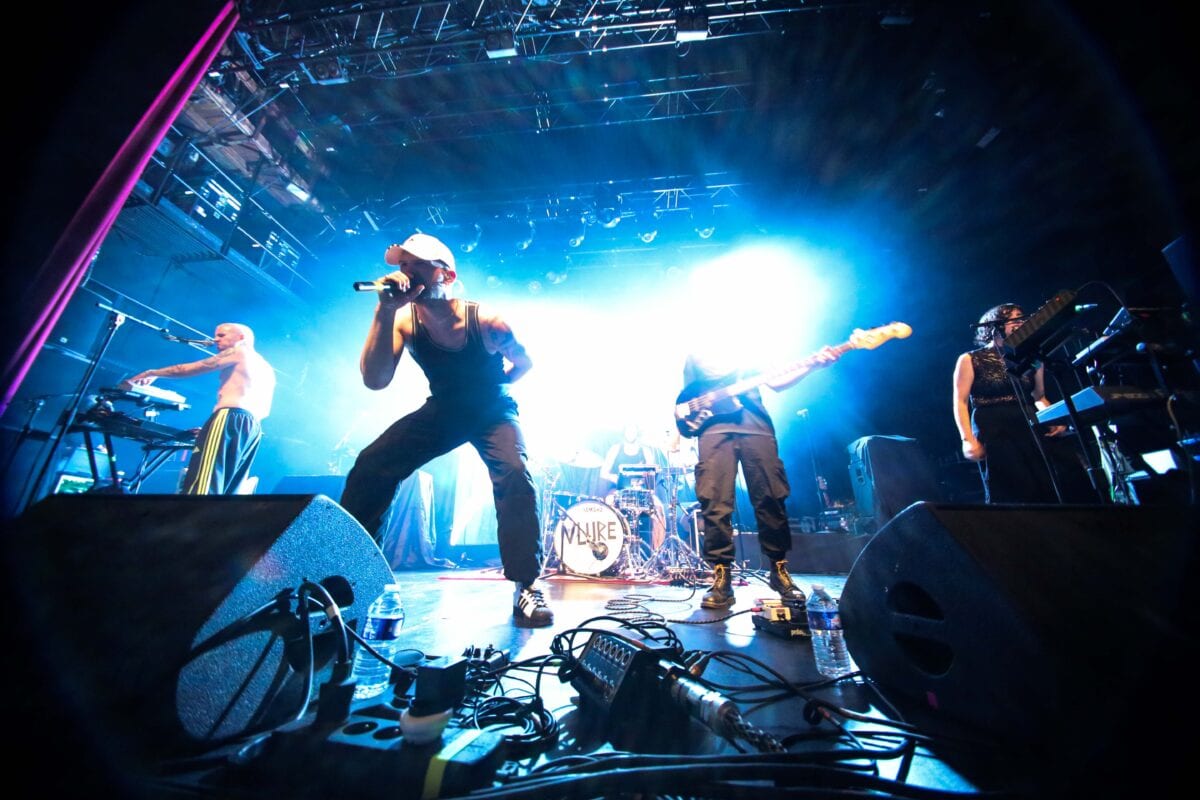
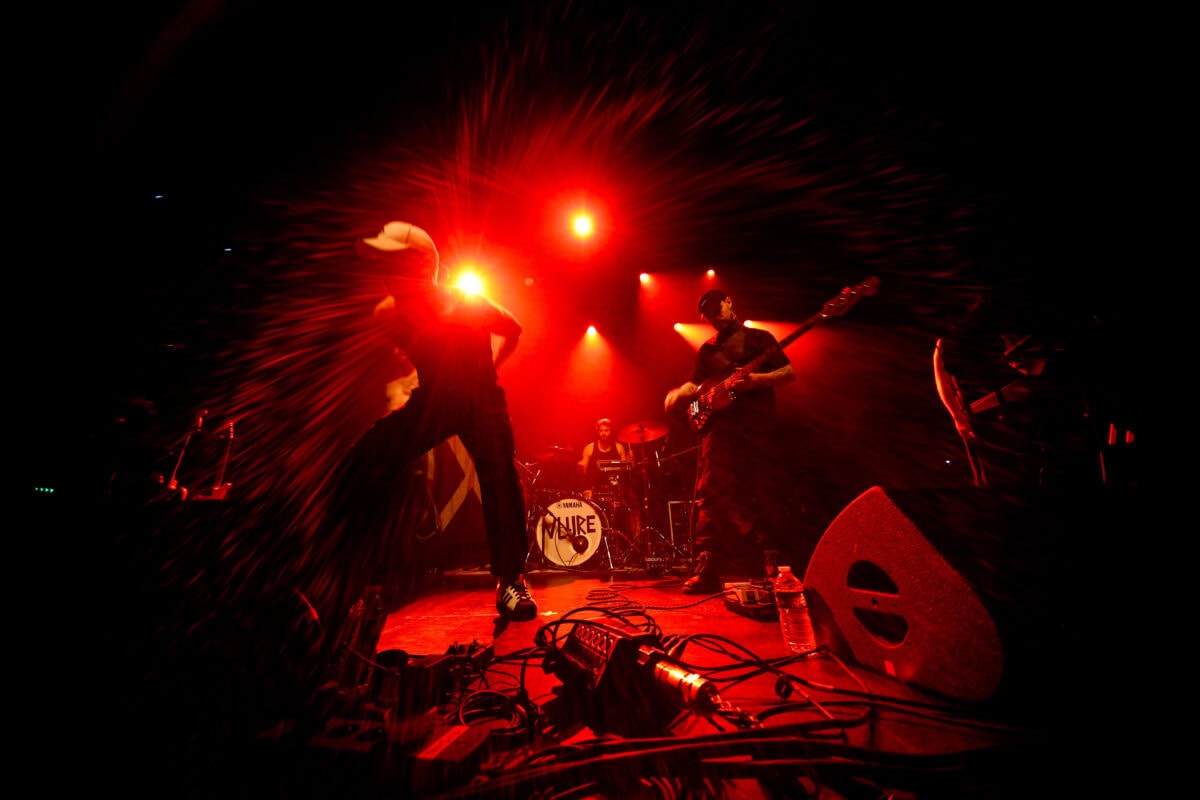
La Face B: Tell us about your signature trance punk or goth trance sound — how did that come together?
Conor Goldie: It’s about being obsessed with both sides of the coin.
Growing up in Glasgow, there’s this deep lineage of guitar bands and an incredible live scene. But as you come of age — in your teens and early twenties — you’re out in club spaces and at afterparties. That nightlife experience naturally fed into what we do.
Even from our very first release — the Desire video — it starts with this strange sequence and then Carlo drops a drum solo over it, which is unconventional.
Hamish Hutcheson: Industrial vibes.
Conor Goldie: It was intentional. Not many people can really blend those elements well — and it took a lot of work to get there.
Hamish Hutcheson: We’ve worked really hard to reach this place — where we can now say, “Yeah, this is what we’ve been trying to create.” There’s always room to grow, but it feels like we’re finally there.
Conor Goldie: Without getting too technical, it’s difficult. Our mix engineer, James Rand, who worked on the album, shared a track and wrote about how hard it is to blend electronic production with live drums — phase issues, flanging, all that.
But he said we actually did a good job. So in that sense, I think we’ve nailed it.
La Face B: And that’s part of what makes you stand out — your singularity.
Hamish Hutcheson: Like Conor said, for years we played in bands contributing to someone else’s vision. With VLURE, the five of us wanted to create something that fully represented us.
We each have a wide range of influences — so the goal was to fuse them into something we all love hearing and love playing.
Conor Goldie: Glasgow’s creative scene has evolved too. Ten years ago, there were very distinct scenes. Now, with small venues closing and funding drying up, everything’s blended into one melting pot.
Our studio building is filled with friends — techno DJs, rappers, jazz singers — and they’re all part of our world now. It’s more fluid, and it’s beautiful.
La Face B: What’s your writing process like? Do you jam, or is it more structured?
Hamish Hutcheson: We’ve tried jamming, but it usually ends up making us laugh too much.
From my perspective — I’m not super technical — I watch these guys come in with ideas: a vocal hook, a drumline, a synth riff. Then we all sit around the laptop, bring out instruments, and build from there.
Alex Pearson: Our first demos always have way too many layers — hundreds of tracks. Then we strip it all back until we have something clean and focused.
Conor Goldie: In a way, it’s like we “un-remix.” Sometimes someone brings in an instrumental that sounds like a full-on club track — and then we adapt it to the band format. Chip away, reshape, rebuild.
La Face B: So it’s quite constructive. Build, deconstruct, rebuild again.
Alex Pearson: Exactly. That’s it.
La Face B: I read you only keep a song if it has that live buzz. Is that true?
Hamish Hutcheson: Definitely. Sometimes we’ll go back to a demo from ages ago, and suddenly one of us has a new idea. But if it doesn’t excite us, it’s not going to excite anyone else.
You can spend two weeks stuck on the same song and realize — it’s not working.
Conor Goldie: If we’re working on something too long, we scrap it. That usually means it’s not worth it.
Our favourite songs tend to be the ones that came together really fast.
La Face B: Your Paris show at Supersonic was described as a “religious experience,” with Hamish literally preaching on stage. How do you balance live spontaneity with studio energy?
Hamish Hutcheson: For me, it’s one and the same. In rehearsals, I move and jump around as much as I do on stage.
I get completely lost in the music these guys create, and I get to tell a story over it. It’s the most beautiful thing I’ve ever done — like therapy. I walk off stage feeling ten times lighter.
It’s never performative — it’s just honest. We all get lost in the moment together. A controlled chaos that somehow works.
La Face B: I interviewed Kelly Finnegan from Monophonics, and he said the energy you give out goes through the audience and comes back to you like a boomerang. It creates something memorable.
Conor Goldie: Totally agree. That’s what it’s about — not ego, not “performing.” It’s about connection. The audience is just as important as us.
Hamish Hutcheson: It’s about building a community — creating a space where people can escape and feel joy.
Conor Goldie: That’s our favourite part — meeting people, connecting. It’s everything.
La Face B: You’ve included Faithless’ Salva Mea in your set. Why that track, and how does it fit?
Conor Goldie: That’s probably on me — my parents love Faithless, and I grew up on Salva Mea. That track was a big blueprint for us. We first did it as a cover.
Hamish Hutcheson: We always said we’d never do covers. But during lockdown, we had to perform two originals and a cover for a livestream. So we mixed a DJ intro into Salva Mea.
Now, it blends into the end of Shattered Faith in our set — and they flow together really well.
Conor Goldie: It’s an homage, really.
Hamish Hutcheson: One of the best covers we’ve ever done.
Conor Goldie: We wouldn’t be where we are without what Faithless did before us.
La Face B: Let’s talk about your own songs. Heaven Sent feels like a step forward from Euphoria — both in production and attitude. How has your sound evolved between those EPs?
Conor Goldie: Massively. Heaven Sent was necessary. Our backs were against the wall. We self-released it with the help of a good friend. There was real resilience behind those recordings.
Most of those songs were road-tested live before going into the studio. Cutting It had been an idea for ages.
Hamish Hutcheson: We refined it on tour — then brought it into the studio.
Conor Goldie: Carlo brought in This Is Not The End, which is the only track from that EP we still play live.
Most of our set is from the new record — but that one’s an anthem.
La Face B: Your debut album Escalate comes out in September. How does it capture who VLURE are right now?
Alex Pearson: We’ve reached our final form.
Hamish Hutcheson: I think the record shows how confident we are in ourselves and in what we’re creating at this moment. It felt like the right time to make something long form. People had been asking for it — we’d put out EPs and singles — and when the opportunity to make an album came, we said, “Let’s go.” I can’t wait for people to hear it. It encapsulates who we are — it’s a snapshot of this moment.
La Face B: Tell us about choosing Escalate as the title.
Conor Goldie: There’s a song on the album called Let It Escalate. Our manager, Taylor, said the word “Escalate” while we were working on that song — I think Niall shouted it out in the studio. We couldn’t settle on a title for the album for a while, and Taylor just went, “Call it Escalate.”
Hamish Hutcheson: According to the dictionary, it means to become more serious, or to rapidly intensify.
Conor Goldie: And it perfectly sums up the sound of the record. There are moments of complete chaos — some of the fastest songs we’ve ever made. We hit 150 BPM, and we’d never gone past 126 before. That’s a big jump.
Hamish Hutcheson: So I had to learn to speak faster!
La Face B: Describe Escalate in your own words.
Conor Goldie: Escalate was a big undertaking, but one that felt absolutely necessary. We always wanted our debut record to stand entirely on its own — to be challenging, distinct. That’s what we talked about from day one. It took a lot of steps to climb — but we enjoyed every one. It blends all our post-punk influences, all the electronic elements, and everything Hamish brings — and it explodes into one place. We worked with some incredible people, including Manni Dee, who co-produced the record. He’s one of my favourite producers — and doesn’t usually work on bands, so that was special.
Hamish Hutcheson: To me, Escalate is like imagining your youth as one long night out — moving through different parts of life, growing into the adult you want to be. The trials, the joys, the pride, the pain — all of it.
It’s nostalgic, but powerful. That’s how it feels to me — powerful.
Conor Goldie: It definitely has a narrative.
Alex Pearson: For me, Escalate captures five best mates working on something really special — something we’ve been building toward for years.
Carlo Kriekaard: It’s the next step — an escalation of our career.
Hamish Hutcheson: Carlo’s all business. Pure business.
La Face B: Being from Glasgow — a city known for its honesty, grit, and massive music heritage — what’s one thing every Glasgow band needs to survive?
Hamish Hutcheson: Tough crowds. And chippies.
Conor Goldie: I’ve had far too many chippies before shows.
Alex Pearson: Long drives to every gig.
Hamish Hutcheson: There’s no venue near Glasgow — everything’s a trek.
Carlo Kriekaard: Everyone holds themselves to a really high standard. It shows in everything. Everyone wants to succeed and supports each other. It’s not overly competitive, but you keep an eye on what others are doing — and it keeps you on your toes.
La Face B: Still, it feels like quite a tight-knit community.
Hamish Hutcheson: Very supportive — but like Carlo said, you have to prove yourself. It’s like, “Who the fuck do you think you are?” until they’re forced to take notice. Then they really back you.
Conor Goldie: That’s just Glasgow. If you say you’re in a band in London, people are like, “Oh cool, what’s that like?”
Say that in a Glasgow pub and the response is, “So is he, and him, and her…”
La Face B: I’ve spent a lot of time in Scotland. I love that straight-to-the-point mentality. I’d rather someone be honest than give false praise and then not show up.
Conor Goldie: If someone’s got a problem with you in Glasgow, you’ll see it all over their face.
La Face B: Who’s your ultimate Scottish music hero?
Hamish Hutcheson: For me, Dale Barclay. He’s right up there.
Conor Goldie: That’s such a massive question. Alex Harvey, for sure. But honestly, my biggest Scottish music heroes are probably all the incredible artists I’ve seen in Glasgow over the years — many of whom never got the opportunities they deserved.
I’ve been in and around bands and the music scene in Glasgow for over a decade, and some of the best shows I’ve ever seen were in tiny venues. It’s hard to keep going in a band — financially, emotionally. It’s a tough decision for a lot of people.
La Face B: Creating what you want, at the pace you want, is a luxury.
Conor Goldie: Getting time off work is brutal for most people.
Too many great bands. Too many heroes. And yes — probably a lot more drinking.
La Face B: What’s a song or artist people would be surprised to know you enjoy?
Conor Goldie: I’ve just been listening to the new PinkPantheress. Which one? Just… PinkPantheress in general.
La Face B: Any book, film or series that’s hit you emotionally recently?
Conor Goldie: On Connection by Kae Tempest. I thought it was incredible — everyone should read it. It’s never been more relevant. It came out a few years ago, but I read it a couple of weeks back.
Hamish Hutcheson: I’ve just read Windswept and Interesting by Billy Connolly. It’s really cool — he grew up in Glasgow and he’s just so unashamedly himself. I’m also reading Anthony Bourdain’s Kitchen Confidential. Great book.
La Face B: Where are we seeing you next?
Conor Goldie: We’re playing Reading and Leeds, and a bunch of other festivals. The album drops in September, and we’ll announce an album tour — Tourcoing and Paris in the Autumn.
La Face B: That’s exciting! Thanks so much, VLURE!
VLURE: Thank you!
